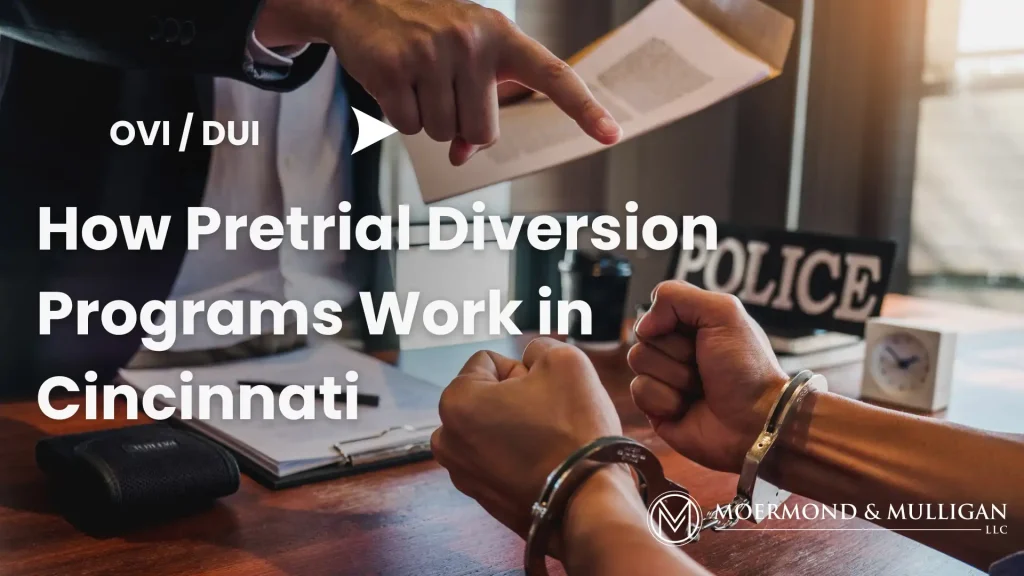Posted on Tuesday, July 1st, 2025 at 9:00 am

Getting charged with a crime in Cincinnati doesn’t always mean you will end up in court or behind bars. Ohio’s criminal justice system has options for some people, especially those facing charges and conviction for the first time or dealing with less serious offenses. One option is a pretrial diversion program. These programs allow individuals to avoid a conviction and address the issues that may have led to their arrest in the first place.
Here’s a look at how pretrial diversion in the federal court system works, who might qualify, and how this path could help protect your future.
What Is Pretrial Diversion and How Does It Work in Cincinnati?
A pretrial diversion program allows individuals who violate the law to avoid trial and potential jail time. Instead, they follow special rules and complete specific tasks to demonstrate their efforts to make better choices.
In Cincinnati, pretrial diversion starts after someone is charged with a crime. The person or their lawyer asks the prosecutor if they can join the program. The prosecutor examines the person’s past and the details of the crime to determine if it is safe for them to participate in the program.
If the person is accepted, they will sign an agreement that outlines the requirements they must fulfill. This might include things such as going to counseling, taking drug or alcohol law treatment classes, doing community service, or paying back the money they owe. They must also check in regularly with program officials to show they are following the rules.
Overall, pretrial diversion provides a structured path for individuals to demonstrate their commitment to making positive changes and taking responsibility for their actions.
Who Qualifies for Pretrial Diversion, and What Are the Benefits?
Not everyone charged with a crime in Cincinnati can participate in a pretrial diversion program. These programs are designed for individuals who meet specific requirements, and qualification depends on a few key factors. Courts typically look for individuals facing non-violent charges with minimal or no criminal record and willing to take responsibility and follow the rules.
Charges that might qualify for diversion include misdemeanors, low-level felonies, and drug-related offenses. For example, shoplifting, minor drug possession, simple assault charges without serious injury, or specific property crimes could be considered for diversion. But people facing violent charges, serious felonies, or crimes involving significant financial losses for victims usually don’t qualify.
These programs are not just about staying out of jail—they are also meant to help people work on issues like addiction or mental health problems. For many, the most significant relief is moving on without carrying the long-term stigma of a conviction.
Consulting with a criminal defense lawyer is a good idea if you are unsure whether you qualify. A lawyer can look at your situation and help determine if applying for diversion is the right choice.
Please read more about criminal appeals here: Common Grounds for Criminal Appeals
Pretrial Diversion vs. Probation: What’s the Difference?
People often confuse diversion with probation, but they are different legal tools.
- Diversion happens before conviction. You participate instead of being prosecuted, and successful completion often leads to case dismissal.
- Probation occurs after conviction and after a portion of your sentence is served. At a point, you may be sentenced to supervised release with strict conditions.
Understanding the difference between pre-trial diversion and probation is essential when figuring out your options, because while both might involve drug testing, treatment, or community service, probation still leaves you with a criminal record. In contrast, diversion allows you to avoid having a record altogether.
Alternative Sentencing Programs and Deferred Prosecution in Cincinnati
Cincinnati and Hamilton County offer alternative sentencing programs to help individuals avoid traditional penalties and convictions, including jail time and heavy fines. These programs focus on rehabilitation and giving individuals a second chance, especially for non-violent crimes. Options include:
- First-time offender programs: Designed for people with no prior record, focusing on education and community service.
- Drug court and diversion programs: Provide intensive supervision and treatment for individuals struggling with substance abuse.
- Mental health courts: Help address mental health issues contributing to criminal behavior.
- Community service programs: Allow defendants to give back to the community instead of serving jail time or paying fines.
- Deferred prosecution agreements (DPAs): While often used for corporations, DPAs can sometimes apply to individuals. Like pretrial diversion, a DPA is an agreement in which prosecutors pause charges. At the same time, you must meet specific conditions, such as paying restitution, attending counseling, or performing community service. If you complete the requirements, charges may be dismissed; availability varies by jurisdiction.
These options show how Cincinnati’s justice system prioritizes rehabilitation and positive outcomes over incarceration.
Can Pretrial Diversion Lead to Expungement?
Avoiding a conviction is only one step toward protecting your future. Once charges are dismissed, you might qualify for criminal record expungement, which can seal your record from public view.
Ohio law allows for expunging many dismissed or resolved cases without a conviction. This process can help you pass background checks, protect your reputation, and move forward in life without the shadow of past charges following you.
If you complete a diversion or complete the program, you should discuss your options with a criminal defense attorney. An attorney can explain your rights and help guide you through the steps toward clearing your record and creating a fresh start.
Speak with Moermond & Mulligan, LLC About Your Options

A pretrial diversion program could be your lifeline if you face charges in Cincinnati. It offers a second chance, helping you avoid a conviction while tackling issues that led to your arrest.
However, applying for diversion is a complex process. Prosecutors do not grant admission automatically. You need skilled legal guidance in Cincinnati to demonstrate that you are a strong candidate and safeguard your rights.
Our team is here to help you understand your rights and take the first step toward securing the necessary benefits. If you face charges, call Moermond & Mulligan, LLC at (513) 421-9790 or complete our contact form today. We help people pursue alternatives to jail and protect their futures every day.
Related Post
Written By: Moermond & Mulligan, LLC
Last Updated: 08-06-2025